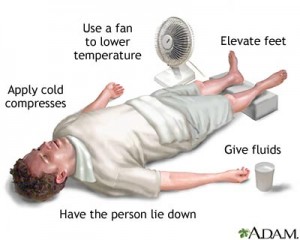There are many ways to avoid overheating that could lead to heat illness or heat stroke. Staying hydrated, avoiding physical activity and keeping in the shade are all ways to stay healthy in the summer, but sometimes that’s not enough. As we age our circulation decreases and it’s harder for our bodies to deal with extreme temperatures.
 It’s important to know the signs of heat exhaustion and heat stroke, as both are even more likely to affect seniors. Seniors do not adjust well to sudden weather changes, and are more likely to have a chronic medical condition that affects how the body deals with heat.
It’s important to know the signs of heat exhaustion and heat stroke, as both are even more likely to affect seniors. Seniors do not adjust well to sudden weather changes, and are more likely to have a chronic medical condition that affects how the body deals with heat.
Heat cramps are a warning sign that heat exhaustion or heat stroke is on its way. Not all heat illness is preceded by heat cramps, but if you do get cramps you should take precaution and cool down immediately. Heat cramps are painful muscle spasms that are more common in the legs, but can occur anywhere (abdomen, back, etc.). Once you have cooled down, gently massage and stretch the affected muscles to relieve cramping.
Heat illness can go far beyond cramping. Before reaching heat stroke there are signs of heat exhaustion. Ignoring heat cramps leads to heat exhaustion, which leads to heat stroke. Signs of heat exhaustion include:
- Dizziness
- Headache, faintness, or fatigue
- Pale and clammy skin
- Rapid and weak pulse
- Fast, shallow breathing
- Intense thirst
Signs of Heat Stroke
Heat stroke is the most serious of heat illness, and can be fatal. Symptoms of heat exhaustion should be taken as a warning! The signs of heatstroke include:
- Skin that is hot, dry and flushed but not sweating
- High body temperature (especially 104 degrees or higher)
- Rapid heartbeat
- Confusion
- Nausea and vomiting
- Headache
- Unconsciousness
If you suspect someone is having a heat stroke, call 911 immediately. Get that person into a cool area and make sure they get some fluids. Once lying down, remove excess clothing and put cool washcloths on the face and neck. Untreated heat stroke can damage the brain, heart, kidneys and muscles. The longer heat stroke goes untreated, the worse the damage can get, leading to permanent problems or even death.
“Heat cramps: First aid – MayoClinic.com.” Mayo Clinic. N.p., n.d. Web. 3 June 2013.
“Heat Stress in the Elderly|Extreme Heat.” CDC Emergency Preparedness & Response Site. N.p., n.d. Web. 3 June 2013.
“Heat stroke: Symptoms – MayoClinic.com.” Mayo Clinic. N.p., n.d. Web. 3 June 2013.